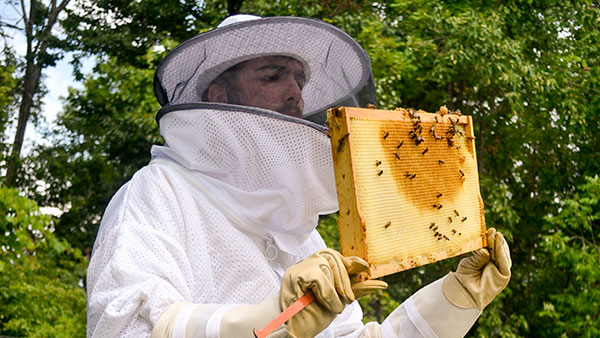[acf field=”code1″]
[acf field=”code2″]
In the Department of Environmental Sciences and Studies, students have combined their appreciation for nature with a dash of business savvy to get some pretty sweet results.
South Hill Forest Products, a business run by students with support from the Department of Environmental Studies and Sciences, farms the Ithaca College Natural Lands, promotes environmental education and makes use of the area’s abundant natural resources that may otherwise be overlooked. The company has come a long way since it was founded in 2007, greatly expanding the scope of its inventory and even inspiring the creation of a new class.
South Hill Forest Products uses the ICNL solely for its non-timber forest products, which are defined by the Center for International Forestry Research as any good or service that comes from a forest other than the wood itself. The ICNL is a 560 acre preserve established in 2004, which aims to provide an educational working landscape for faculty and staff.
Items for sale by South Hill Forest Products utilize the wax and honey from seven beehives located near the Office of Public Safety and Emergency Management, a collection of sugar maples off Coddington Road called the sugar bush and student-designed labs in the Center for Natural Sciences to grow mushrooms, which were originally grown in the ICNL. After the resources are harvested, they are used to create all-natural products such as honey, syrups, soaps and salves, a selection that has expanded greatly since the company’s founding in 2007.
Jill Weidman, a junior environmental science major, is the current lab manager and head beekeeper for South Hill Forest Products. Though the company’s management is guided by faculty, students like Weidman are the driving force behind South Hill Forest Products, which was founded by a student during his time at Ithaca College.
“Four or five years ago, this guy Kris Shapiro [’09] somehow decided that he wanted to make maple syrup,” Weidman said. “So, he and his friends looked at some satellite maps of the Natural Lands and found a place with a high concentration of sugar maples.”
Soon afterward, Shapiro was producing syrup under the company name of South Hill Forest Products.
Around the same time, Jason Hamilton, professor and chair of the Department of Environmental Studies and Sciences, was working on a project growing mushrooms with one of his classes. He recognized the similarities between his work and Shapiro’s, and decided to merge the two projects.
“The mushroom farm expanded into other kinds of mushrooms, and it just kept growing from there,” Hamilton said. “The things we’re doing now are all 100 percent student ideas. Eventually, I decided that it was big enough to create a new class.”
The class, taught by Hamilton, is called “Selected Topics in Natural Resources and Ecology: Farming the Forest” and runs during the spring semester. The curriculum works in tandem with South Hill Forest Products to farm the ICNL and use the resources to stock the company’s inventory. Some students, like Weidman, stay on campus over the summer as employees for the Department of Environmental Studies and Sciences, keeping South Hill Forest Products running and continuing care of the beehives during their prime honey season. In this way, the business is able to stay up and running year-round, under the supervision of faculty, even after the founding students graduated.
“Within the class, the students run their own small business. [South Hill Forest Products] is the entity that makes and sells all the products from the class,” Hamilton said.
Ben Tolles, a junior environmental science major who took Hamilton’s class last spring, can attest to how time consuming his work with South Hill Forest Products the project can be. He also worked this summer as beekeeper and lab manager alongside Weidman.
“It’s really time intensive,” Tolles said. “When you’re doing the maple syrup, it’s hours of collecting the maple syrup and then boiling it. Jason expects nine to 12 hours from you weekly, which, on top of an 18 credit course load, is a lot of work.”
Hamilton also expects his students to learn far more than how to simply keep the bees buzzing and the syrup flowing. His class includes many business components and marketing skills; every student must be able to give a professional-grade tour of all the South Hill Forest Products’ facilities and provide detailed information on how the products are made. They also run a website at southhillforestproducts.com.
“The students do everything,” Hamilton said. “They tap the trees, they collect the sap, they make the syrup, they bottle it and make their own labels. Pretty much anything to do with the process, it’s up to them.”
Any student can purchase South Hill Forest Products from the Bookstore and register for the non–timber forest products class this spring. In the past, Hamilton said the class has attracted a variety of majors, from music performance to integrated marketing communications.
“Anyone who likes to be outside and work with their hands, learn a concrete skill and have some fun should definitely give it a try,” Weidman said. “Really, if anyone has an interest in the department there are plenty of ways for them to get involved.”
Despite its time-consuming nature, Tolles said he found his experience farming the forest to be incredibly rewarding.
“You’re learning a whole new craft,” Tolles said. “Everyone uses syrup and honey, but people don’t realize what goes behind it. There’s so much to it. The fact that you’re learning this craft that people don’t really recognize but is still integral to society is definitely the best part.”














